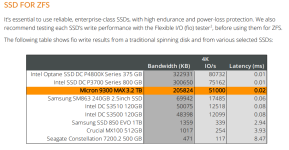ZFS and you read all the issues with consumer
That is because ZFS allows for really bad setups with write amplification. Take notice that these problem cases are always some obscure RAIDZ1, QEMU instead of RAW, TrueNAS as VM, Windows Server with 30TB drive as a network share, cases.
It is almost never the "Proxmox with ZFS mirror boot and data disk, 16k default and RAW disk"
In my case I just want a pair for the os and will have separate drives for data.
If that is what you want for whatever reason, you do you.
That alone is more than what most homelabbers do.
if I can get enterprise m.2 ssd's vs consumer for about the same price then I will just use the enterprise stuff.
Sure, but you won't get enterprise for the same price.
You get really old enterprise for the same price as new consumer.
Not that there is even anything real enterprise that makes use of M.2

I have some pretty old intel 320's
These are some pretty bad SSDs. Which is totally fine for most workloads.
I would just make sure to not use two Intel 320 but mix in another bad drive from another vendor.
Just so you don't risk two mirror drives failing at the same time.


